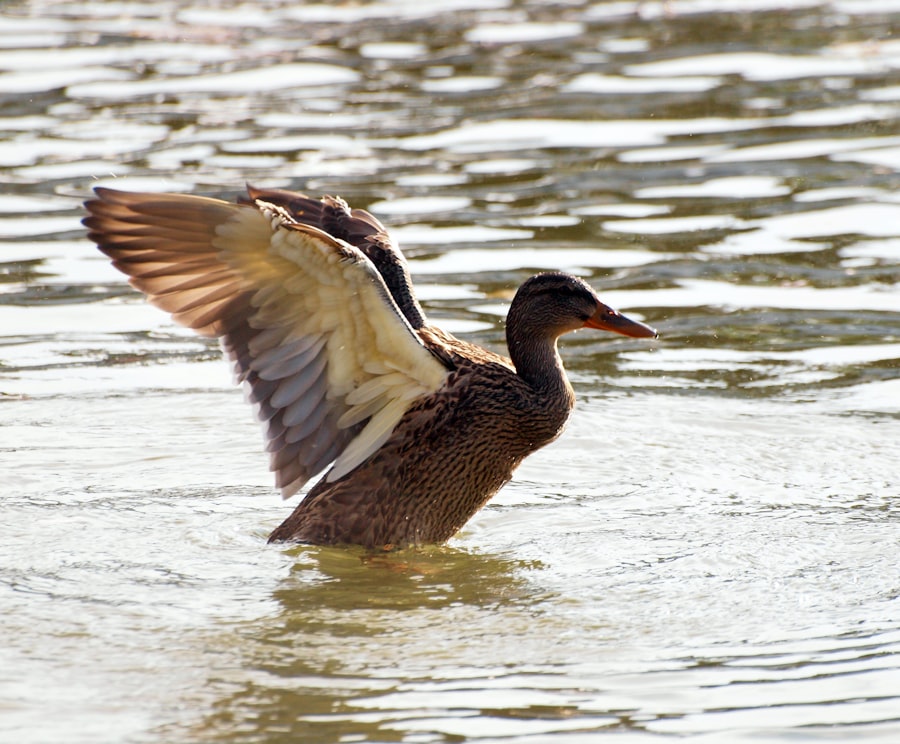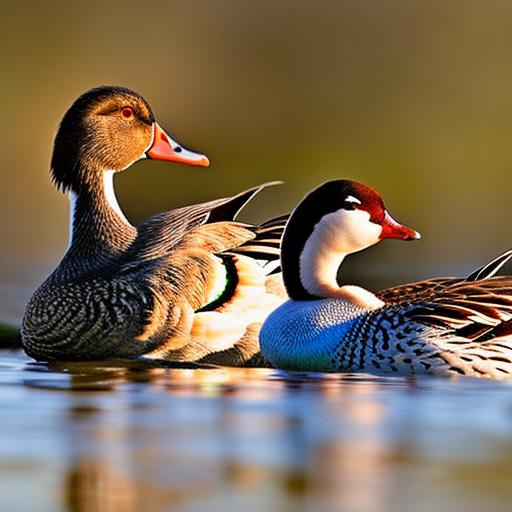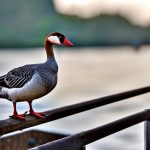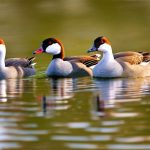Ducks and geese are both popular poultry birds that are often kept on farms and homesteads. While they may appear similar at first glance, there are several key differences between ducks and geese in terms of their appearance and behavior.
Ducks are smaller in size compared to geese, with a compact body and a rounded head. They have webbed feet that are designed for swimming, as ducks are known for their love of water. Geese, on the other hand, are larger and have a more elongated body shape. They have longer necks and legs, which allow them to graze on grass and forage for food.
In terms of behavior, ducks are more social and tend to live in flocks. They are known for their playful nature and can often be seen splashing around in ponds or puddles. Geese, on the other hand, are more territorial and protective of their flock. They are known to be excellent guard animals and will sound the alarm if they sense any potential danger.
Key Takeaways
- Ducks and geese have distinct differences in appearance, behavior, and temperament.
- Housing requirements for ducks and geese differ in terms of space, water access, and bedding.
- Ducks and geese have different dietary needs, with geese requiring more grass and roughage.
- Geese lay fewer eggs than ducks, but their eggs are larger and richer in flavor.
- Ducks are generally more social and adaptable, while geese can be more aggressive and territorial.
Housing Requirements: Accommodating Ducks and Geese
When it comes to housing ducks and geese, there are a few key considerations to keep in mind. Both ducks and geese require shelter that provides protection from the elements, predators, and disease.
For ducks, a simple structure such as a coop or shed with a secure door is usually sufficient. Ducks also require access to water for swimming, so it’s important to provide them with a pond or pool that is large enough for them to fully submerge themselves.
Geese, on the other hand, require more space due to their larger size. A larger coop or shed with ample room for them to move around is necessary. Geese also need access to grassy areas where they can graze, so it’s important to provide them with a fenced-in yard or pasture.
Both ducks and geese require bedding in their housing to keep them comfortable and to absorb waste. Straw or wood shavings are commonly used as bedding material.
Feeding and Nutrition: Meeting the Dietary Needs of Ducks and Geese
Ducks and geese have different dietary needs, so it’s important to provide them with the appropriate feed to ensure their health and well-being.
Ducks are omnivorous and have a varied diet that includes both plant matter and small insects or invertebrates. A commercial duck feed that is specifically formulated for ducks is recommended, as it provides the necessary nutrients for their growth and development. Ducks also enjoy foraging for food, so providing them with access to grassy areas or a garden can be beneficial.
Geese, on the other hand, are primarily herbivorous and graze on grass, weeds, and other plant matter. They can also be supplemented with a commercial goose feed that is high in fiber. It’s important to provide geese with access to fresh grass or pasture so they can graze throughout the day.
Both ducks and geese require access to fresh water at all times. Ducks need water for swimming and cleaning their feathers, while geese need water for drinking and preening. It’s important to provide them with clean water that is free from contaminants.
Egg Production: Comparing Duck and Goose Egg Laying Habits
When it comes to egg production, there are some notable differences between ducks and geese. Ducks are known for their prolific egg-laying abilities, with some breeds capable of laying up to 300 eggs per year. They typically start laying eggs at around 5-6 months of age and will continue to lay throughout the year.
Geese, on the other hand, are not as prolific egg layers as ducks. Most goose breeds will lay around 20-40 eggs per year, with some breeds laying slightly more. Geese typically start laying eggs at around 2-3 years of age and will lay in the spring and early summer months.
Factors that can affect egg production in both ducks and geese include diet, lighting conditions, and stress levels. Providing a balanced diet, ensuring they have access to fresh water, and minimizing stress can help maximize egg production in both ducks and geese.
Temperament and Behavior: Managing the Personalities of Ducks and Geese
Ducks and geese have different temperaments and behaviors, so it’s important to understand their personalities in order to effectively manage them.
Ducks are generally social animals that enjoy the company of other ducks. They are known for their playful nature and can often be seen splashing around in water or engaging in social behaviors such as preening each other’s feathers. However, some duck breeds can be more aggressive than others, especially during breeding season. It’s important to monitor their behavior and separate any aggressive individuals if necessary.
Geese, on the other hand, are known for their protective nature and can be more aggressive than ducks. They are excellent guard animals and will sound the alarm if they sense any potential danger. Geese can also be territorial, especially during breeding season, so it’s important to provide them with enough space to establish their own territory.
Training and socialization techniques can be used to manage the behavior of both ducks and geese. Positive reinforcement training methods can be used to teach them basic commands or to discourage unwanted behaviors. Socializing them from a young age can also help them become more comfortable around humans and other animals.
Health and Wellness: Maintaining the Well-Being of Ducks and Geese

Keeping ducks and geese healthy is essential for their overall well-being. There are several common health issues that can affect ducks and geese, including respiratory infections, parasites, and foot problems.
Preventative measures such as regular vaccinations, proper nutrition, and good hygiene practices can help minimize the risk of disease. It’s important to provide ducks and geese with a clean and dry living environment, as damp conditions can lead to respiratory issues. Regularly cleaning their housing and providing fresh bedding can help prevent the buildup of bacteria or parasites.
Regular health checks are also important to catch any potential health issues early on. It’s important to monitor their behavior, appetite, and overall appearance for any signs of illness. If any health issues are detected, it’s important to consult with a veterinarian who specializes in poultry.
Breeding and Reproduction: Raising Ducklings and Goslings
Breeding and reproduction in ducks and geese can be a rewarding experience, but it also requires careful planning and management.
Ducks are relatively easy to breed, as they will naturally mate and lay eggs. However, if you are looking to breed specific duck breeds or want to control the breeding process, artificial insemination may be necessary. Ducks typically lay their eggs in nests that they build on the ground or in nesting boxes. Incubation takes around 28 days, after which the ducklings will hatch.
Geese, on the other hand, require more space and specific conditions for breeding. They typically mate for life and will build nests on the ground or in elevated areas such as tree stumps or platforms. Geese eggs take around 28-35 days to hatch, depending on the breed.
Raising ducklings and goslings requires special care and attention. They need a warm and secure brooder area with access to food and water. It’s important to provide them with a balanced diet that is appropriate for their age and development. Regular health checks are also important to ensure they are growing properly and are free from any health issues.
Cost Considerations: Budgeting for Keeping Ducks and Geese
Keeping ducks and geese can be a rewarding experience, but it’s important to consider the costs involved before getting started.
The initial setup costs for housing and equipment can vary depending on the size and type of structure you choose. Coops or sheds for ducks and geese can range from a few hundred dollars to several thousand dollars, depending on the size and quality. Fencing or pasture areas may also be necessary, which can add to the overall cost.
Ongoing expenses include feed, bedding, and veterinary care. Ducks and geese require a balanced diet that includes commercial feed, which can range from $10 to $30 per bag depending on the brand and quantity. Bedding materials such as straw or wood shavings will need to be replaced regularly, which can add to the overall cost.
It’s also important to budget for any unexpected expenses such as veterinary care or repairs to housing or equipment. Having an emergency fund set aside can help cover these costs if they arise.
Uses and Benefits: Utilizing Ducks and Geese for Agriculture and Homesteading
There are several benefits to keeping ducks and geese on a farm or homestead. They can provide a source of eggs, meat, and feathers, as well as offer pest control benefits.
Duck eggs are known for their rich flavor and high nutritional value. They are often used in baking or cooking and can be a valuable addition to any kitchen. Duck meat is also popular for its unique flavor and is often used in gourmet dishes. Duck feathers can be used for crafts or sold for additional income.
Geese eggs are larger than duck eggs and have a rich flavor that is similar to chicken eggs. They can be used in cooking or baking just like duck eggs. Goose meat is known for its rich flavor and is often used in traditional dishes such as roast goose. Goose feathers are also valuable and can be used for crafts or sold for additional income.
Both ducks and geese are excellent foragers and can help control pests such as slugs, snails, and insects. They can be used to graze on grassy areas or in orchards, helping to keep the area free from unwanted pests.
Choosing Between Ducks and Geese for Your Farm or Homestead
When it comes to choosing between ducks and geese for your farm or homestead, there are several factors to consider. It’s important to think about your specific needs and goals, as well as the space and resources available to you.
Ducks are a good choice if you are looking for prolific egg layers and enjoy their playful nature. They are also a good option if you have limited space, as they require less room compared to geese. Ducks are also more social and can be easier to manage in terms of behavior.
Geese are a good choice if you are looking for larger eggs and enjoy their protective nature. They are also a good option if you have ample space and can provide them with access to grassy areas for grazing. Geese can be more territorial and aggressive compared to ducks, so it’s important to consider this when making your decision.
Ultimately, the choice between ducks and geese will depend on your personal preferences and the specific needs of your farm or homestead. Both ducks and geese can provide valuable benefits and can be a rewarding addition to any agricultural or homesteading operation.
If you’re considering keeping ducks or geese, you may also be interested in learning about the best kind of coop for chickens. Poultry Wizard has a helpful article that discusses different types of chicken coops and their benefits. Understanding the right coop for your chickens can provide valuable insights into creating a comfortable and safe environment for your waterfowl as well. Check out the article here to ensure you have all the information you need to provide the best housing for your feathered friends.
FAQs
What are the differences between ducks and geese?
Ducks are smaller in size compared to geese. Geese have longer necks and legs, and they are generally louder than ducks. Ducks are more social and can be kept in larger groups, while geese are more territorial and prefer smaller groups.
What are the benefits of keeping ducks?
Ducks are great foragers and can help control pests in your garden. They also produce nutrient-rich eggs and meat. Additionally, ducks are entertaining to watch and can make great pets.
What are the benefits of keeping geese?
Geese are excellent guard animals and can help protect your property from intruders. They also produce large eggs and meat, and their feathers can be used for insulation and crafts. Geese are also very loyal and can make great pets.
What are the housing requirements for ducks and geese?
Ducks and geese require a secure and dry shelter to protect them from predators and the elements. They also need access to water for swimming and cleaning. The shelter should be cleaned regularly to prevent the buildup of waste and bacteria.
What do ducks and geese eat?
Ducks and geese are omnivores and eat a variety of foods, including grains, vegetables, insects, and small animals. They also require access to clean water for drinking and swimming.
What are the potential health issues for ducks and geese?
Ducks and geese can be susceptible to respiratory infections, parasites, and other diseases. It is important to provide them with a clean and dry living environment, as well as regular veterinary care.
Can ducks and geese be kept together?
Yes, ducks and geese can be kept together, but it is important to monitor their interactions. Geese can be aggressive towards ducks, especially during mating season. It is recommended to keep them in separate groups or provide enough space for them to avoid conflict.
Meet Walter, the feathered-friend fanatic of Florida! Nestled in the sunshine state, Walter struts through life with his feathered companions, clucking his way to happiness. With a coop that’s fancier than a five-star hotel, he’s the Don Juan of the chicken world. When he’s not teaching his hens to do the cha-cha, you’ll find him in a heated debate with his prized rooster, Sir Clucks-a-Lot. Walter’s poultry passion is no yolk; he’s the sunny-side-up guy you never knew you needed in your flock of friends!







